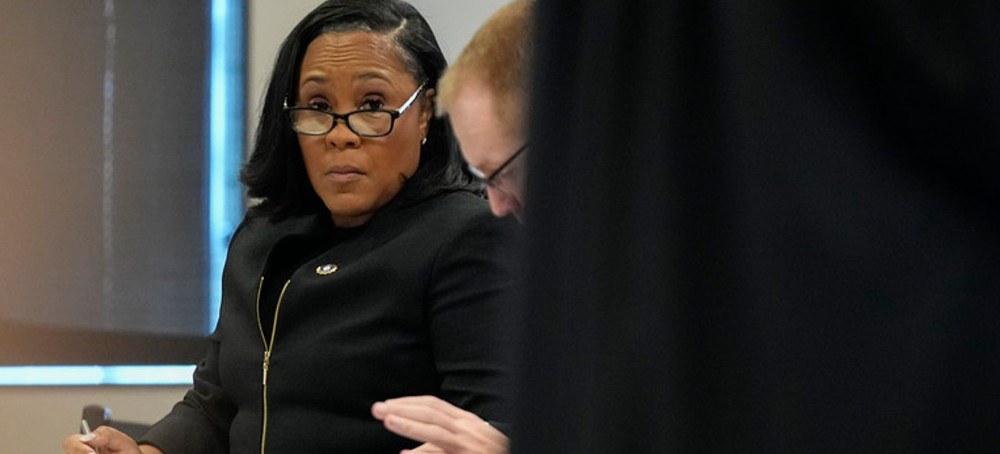I Was Just Subpoenaed by Trump's Georgia Grand Jury. Here's What I'll Tell Them.
 Fulton County District Attorney Fani Willis sits in a courtroom in the Fulton County Courthouse on July 11, 2023, in Atlanta. (photo: Brynn Anderson/AP)
Fulton County District Attorney Fani Willis sits in a courtroom in the Fulton County Courthouse on July 11, 2023, in Atlanta. (photo: Brynn Anderson/AP)
The Trump election interference case raises unique questions about the role of a free press in preserving democracy.
I’m at Buteco, a bar in East Atlanta. I don’t drink anymore. I’m thinking about it.
It’s the second time I’ve been asked to testify. A year ago, I sat in front of a grand jury on the third floor of the courthouse — which is now buttressed with orange barricades in anticipation of incipient madness — to describe barging into a semi-clandestine meeting of Republicans pretending to be Georgia’s official electors in December 2020.
For more than two years, Fulton County District Attorney Fani Willis has been probing whether Trump and his allies broke the law when they tried to overturn the results of the 2020 presidential election in Georgia. The prosecutor has said that she will announce charging decisions by the end of August.
I went to Georgia’s state Capitol on December 14, 2020, to watch the solemn and usually forgettable ritual casting of electoral votes. As Stacey Abrams led the Democratic delegation upstairs, Republicans sat in a reserved room on the Capitol’s second floor to prepare a competing — and potentially illegal — slate of their own.
The Republicans threw me out of the room moments after I entered, camera phone in hand, going live on Facebook. When I asked what kind of gathering they were having, they told me it was an “education meeting.” As it turns out, Donald Trump’s election team had sent an email the previous night, instructing the group to maintain “complete secrecy.”
Election madness wasn’t incipient in 2020; it was happening all around us. And I get thrown out of a lot of places. So I didn’t think much about it beyond tweeting a still from the Facebook Live, asking my friends to identify the people in the picture.
But because I was lied to and thrown out, it confirmed that the legislators were acting in secret, that they didn’t want the press or public to know what they were doing. That specific bit of information has apparently been important enough to ask me to convey it to a grand jury — again.
Security at the Fulton County Courthouse is tight on a normal day. The ghosts of Judge Rowland Barnes, court reporter Julie Ann Brandau, Sgt. Hoyt Teasley and Special Agent David G. Wilhelm — the four victims of Brian Nichols’s murder spree in 2005 — still haunt the space and inform its defenses.
As Willis prepares a possible case against Trump, she’s taken even more serious precautions. The district attorney asked judges to reschedule hearings and other work for the next two weeks. Her office staff is working off-site for the moment.
Willis has empaneled two grand juries for the coming month, and I have a subpoena for both of them. This process gives plausible deniability to the members of the grand jury reviewing election interference — and protection from public harassment. It also means I can’t tell which of the panels I’ve been called before is the one probing Trump — or if it’s both of them — until after I’m called. (I have no intention of disclosing those details, regardless.)
Journalists should not be testifying in front of grand juries. We are not agents of the government, gathering intelligence to be used in prosecutions. Our role should be adversarial, and my role as a journalist in Atlanta has regularly been just that with regard to Fulton County government, law enforcement, and even the operation of its courts. The county jail is in shambles, the courts are backed up, and prosecutors’ increased emphasis on gang cases raises questions about criminal justice reform in this city.
Grand jury proceedings are secret, and for ethically defensible reasons. If a grand jury chooses not to indict someone, open proceedings would leave a stain of suspicion on people without the detergent of sunlight and a public trial. But the secrecy also means that a journalist who is called to testify cannot generally assure their sources that they didn’t tell the government secrets they had promised to keep. It is for this reason that journalists who work on sensitive material usually fight such subpoenas.
I am reviewing my legal options with retained counsel. But I expect to testify, as before, after receiving assurances that I will not be compelled to offer information outside of the narrow issue of election interference and my observations on December 14, 2020.
The Trump election interference case raises unique questions about the role of a free press in preserving democracy. I ignore my obligations to that not just at my own peril, but also that of every journalist.

No comments:
Post a Comment
Note: Only a member of this blog may post a comment.